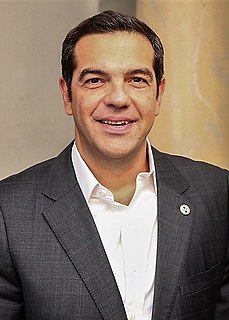A Quote by Alexis Tsipras
Greece and the Greek people have recently had to deal with the harshest consequences of the global and European economic crisis. As an economy and as a society, we have had to experience a program of disastrous austerity which made the problems more acute instead of resolving them.
Related Quotes
Although this crisis in some ways started in the United States, it is a global crisis. We bear a substantial share of the responsibility for what has happened, but factors that made the crisis so acute and so difficult to contain lie in a broader set of global forces that built up in the years before the start of our current troubles.
The current economic crisis...has numerous causes and sends a powerful message about the need for a profound revision of the model of global economic development. It's an acute symptom that is added to other more grave and already well-known ones, such as the continued imbalance between wealth and poverty, the scandal of hunger, the ecological emergency and the problem of unemployment, which has now become general. In this context a strategic re-launching of agriculture appears decisive.
Khomeini obviously had many problems, but he had one clever side to him. He never made economic promises to people and as a result, he never led to dissatisfaction in this perspective. Because they need to get votes, they use misleading slogans. And this leads to rising expectations. I had a personal experience.
I think that the real tragedy of Greece - aside of the savagery of European bureaucracy, Brussels bureaucracy and northern banks, which was really savage - is that the Greek crisis didn't have to erupt. It could have been taken care of pretty easily at the very beginning. But it happened and Syriza came into office with a declared commitment to combat it, and in fact as I recall they actually called a referendum, which horrified Europe.
Look at Ukraine. Its currency, the hernia, is plunging. The euro is really in a problem. Greece is problematic as to whether it can pay the IMF, which is threatening not to be part of the troika with the European Central Bank and the European Union making more loans to enable Greece to pay the bondholders and the banks. Britain is having a referendum as to whether to withdraw from the European Union, and it looks more and more like it may do so. So the world's politics are in turmoil.
The more people that understand and are made able to spot liberalism, and then the more people are able to associate liberalism with the problems in their lives, the political problems, the economic problems, the more people can be conditioned and educated to understand that liberalism is the problem, coupled with the ability to spot it, would be the fastest way to eradicate it. It would be really helpful if we had a Republican Party engaged in this.
































